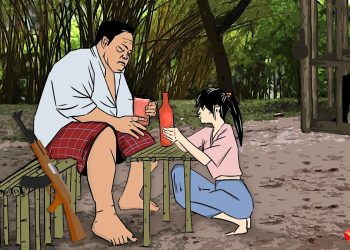Chinese special envoy Deng Xijun recently traveled to the China-Myanmar border and met with representatives of seven of Myanmar’s ethnic armed organizations (EAOs). It was his second trip in three months, following a visit to the border and Naypyitaw in December.

He was seen visiting the Mong La area—officially known as Shan State Special Region 4—and also met with leaders of the Kachin Independence Organization (KIO) in eastern Shan State on Monday. The special envoy reportedly also visited camps for internally displaced persons (IDPs) in that area.
Border-based ethnic sources confirmed that the envoy met separately with representatives of the United Wa State Army (UWSA), the Kachin Independence Army (KIA), the National Democratic Alliance Army (NDAA), the Shan State Progress Party (SSPP), the Arakan Army (AA), the Ta’ang National Liberation Army (TNLA) and the Myanmar National Democratic Alliance Army (MNDAA).
Three of the EAOs—the KIA, TNLA and MNDAA—are actively fighting the regime. The KIA is based in Kachin State in northern Myanmar, while the TNLA and MNDAA are based in northeast Myanmar’s Shan State.
Before succeeding Sun Guoxiang as China’s special envoy to Myanmar, Deng served as Beijing’s special envoy for Association of Southeast Asian Nations (ASEAN) affairs from 2020 to November last year.
During his December visit, he held talks with Myanmar coup leader Senior General Min Aung Hlaing after visiting EAOs in the north.
Deng’s second visit was intended to cement ties with those EAOs as well as to persuade them to reach some form of ceasefire with the regime in Naypyitaw. China is increasingly worried about the instability in Myanmar and the West’s support for the anti-regime opposition led by the shadow National Unity Government (NUG).

Some observers see the flurry of activity by Deng as an effort to counter the Burma (Burma Unified through Rigorous Military Accountability) Act, part of the National Defense Authorization Act (NDAA) that was passed by the United States Congress in December.
The Burma Act authorizes funds and technical assistance for anti-junta forces in Myanmar, including EAOs. The US has pledged to continue to support Myanmar opposition forces inside and outside of Myanmar.
US State Department Counselor Derek Chollet recently told The Irrawaddy in an interview, “Our policy has been rooted in three lines of effort. First was to isolate and punish the junta and to make it harder for the junta to generate revenue and acquire resources and weapons. Second has been to help support the pro-democratic opposition within Myanmar.”
He also pledged to work with the NUG, which recently opened an office in Washington.
Chollet said the US has been engaging with EAOs and the NUG’s armed wing, the People’s Defense Force (PDF). “We have been engaging with them,” he said.

Given Beijing’s influence over several EAOs in the north, any effort by the West to step up engagement and support for EAOs and PDF forces operating in ethnic territories would be of concern to China.
In a recent op-ed for Nikkei Asia, former US ambassador to Myanmar Scot Marciel called on the US government to provide substantial funding to the NUG and its partners, as envisioned in the Burma Act.
He wrote, “The US also should consider providing equipment to help the resistance improve communications and build on nascent efforts to supply internet access to the public. Washington can also gather military experts to consider ways to help the resistance counter the regime’s air power, mindful of concerns about supplying sophisticated anti-aircraft systems.”
He urged the Biden administration to take a leadership role, as regional grouping ASEAN has faltered on Myanmar. “Absent a viable ASEAN strategy, the Biden administration should assert leadership by offering much more support to the resistance campaign to force the military out of power, or at least to weaken it sufficiently that it looks for a way out,” he wrote.
“Provision of substantial arms directly to the resistance is both unlikely to happen and would be difficult logistically, but channeling funds would free up resources that the NUG could use to purchase weapons,” the former ambassador wrote.

















